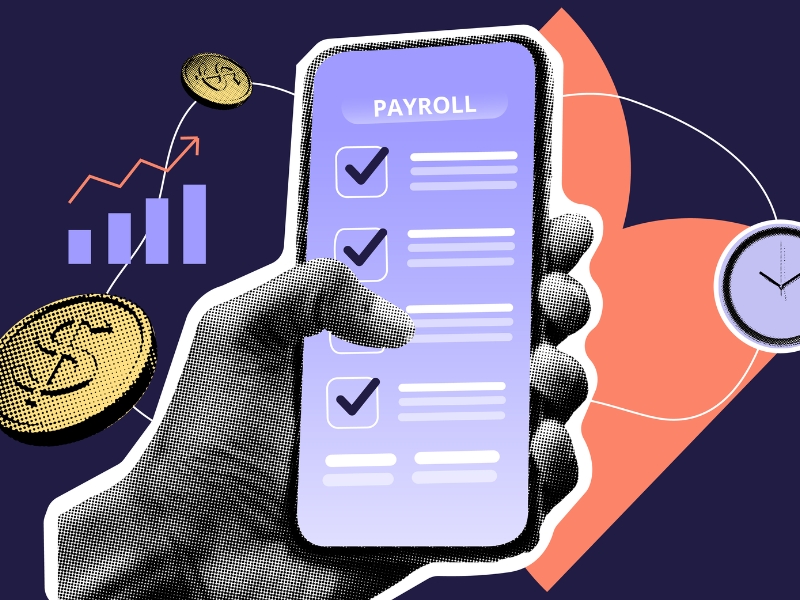Calculating wages, filing taxes, and staying compliant with ever-changing regulations can feel overwhelming—especially when you’d rather focus on growing your business. That’s where payroll for small business comes in. With the right payroll system, you can streamline employee payments, ensure compliance, and free up valuable time to focus on what you do best.
What is Payroll for Small Business?

Payroll for small business refers to the process of managing employee payments, tax withholdings, and compliance through specialized software or services. Instead of manually calculating wages, deductions, and tax filings, a small business payroll system automates these tasks, making the process faster, more accurate, and less stressful.
Whether you have a handful of employees or a growing team, payroll software is designed to handle the complexities of payroll management so you don’t have to.
Why Do Small Businesses Need Payroll Systems?
Managing payroll manually can be time-consuming and prone to errors. Here’s why investing in payroll for small business is a smart move:
- Saves Time: Automating payroll tasks like wage calculations, tax withholdings, and payment processing frees up hours in your busy schedule.
- Ensures Compliance: Payroll regulations are constantly changing at the federal, state, and local levels. A payroll system helps you stay compliant and avoid costly penalties.
- Reduces Errors: Manual calculations can lead to mistakes, such as incorrect paychecks or missed tax deadlines. Payroll software minimizes these risks.
- Improves Security: Payroll involves sensitive employee information. Most payroll systems use advanced security measures to protect this data.
- Enhances Employee Satisfaction: Timely and accurate paychecks, along with self-service options, boost employee morale and trust.
Key Features of Payroll Systems for Small Businesses

When choosing a payroll system, look for features that address your specific needs. Here are some must-have features for payroll for small business:
- Automated Wage and Tax Calculations: Payroll software automatically calculates employee wages, taxes, and deductions, ensuring accuracy and saving you time.
- Flexible Payment Options: Whether your employees prefer direct deposit, paper checks, or paycards, a good payroll system offers multiple payment methods.
- Tax Filing Services: Many payroll systems handle tax filings on your behalf, including quarterly and annual returns, so you don’t have to worry about missing deadlines.
- Employee Self-Service Portals: Self-service portals allow employees to access pay stubs, update personal information, and manage tax withholdings, reducing administrative tasks for you.
- Compliance Assistance: Payroll systems provide access to mandatory tax forms (like W-2s and W-9s) and notify you of changes to wage and tax laws.
- Seamless Integrations: Integration with accounting software (like QuickBooks) and timekeeping systems eliminates duplicate data entry and ensures smooth operations.
- Mobile Accessibility: Mobile-friendly payroll systems let you process payments, check tax filings, and manage payroll on the go.
- Comprehensive Reporting: Detailed reports on wages, taxes, and hours worked help you make informed financial decisions.
How to Choose the Right Payroll System for Your Small Business
With so many options available, selecting the right payroll system can feel daunting. Here’s a step-by-step guide to help you make the best choice:
- Identify Your Pain Points: What challenges are you facing with your current payroll process? Is it time-consuming calculations, compliance issues, or lack of integration with other systems? Pinpointing your pain points will help you find a solution that addresses your specific needs.
- Evaluate Features: Look for features that align with your business requirements. For example, if you have remote employees, mobile accessibility might be a priority. If you’re struggling with tax filings, choose a system with full-service tax support.
- Consider Local Tax Assistance: Local tax regulations can vary widely and change frequently. Ensure your payroll provider offers assistance with local taxes to avoid compliance headaches.
- Assess Time Savings: How much time will the new system save you? If you’re currently spending hours on manual payroll tasks, automation can significantly reduce your workload.
- Compare Costs: Payroll costs vary based on factors like the number of employees, payroll frequency, and additional services. Request a detailed pricing breakdown to avoid surprises.
- Check Integration Capabilities: If you’re already using accounting or HR software, choose a payroll system that integrates seamlessly with your existing tools.
- Review Support Services: Does the provider offer 24/7 customer support? Are they responsible for compliance updates and data security? Reliable support is crucial for a smooth payroll experience.
- Test the System: Many providers offer free trials or demos. Take advantage of these to see if the system meets your expectations before committing.
Why Choose ADP for Small Business Payroll?
ADP is a trusted name in payroll solutions, offering fast, easy-to-use systems backed by expert support. Here’s what makes ADP a great choice for payroll for small business:
- Automated Calculations: Wages and tax deductions are calculated automatically, saving you time and reducing errors.
- Compliance Support: ADP helps you stay compliant with federal, state, and local regulations.
- Mobile Accessibility: Process payroll and check tax payments from anywhere, at any time.
- Employee Self-Service: Employees can access pay stubs and manage their information online.
- Scalable Solutions: As your business grows, ADP offers additional services like HR support, benefits administration, and more.
Conclusion
Managing payroll doesn’t have to be a headache. With the right payroll for small business system, you can automate tedious tasks, ensure compliance, and focus on what really matters—growing your business. Whether you’re a solopreneur or managing a small team, investing in payroll software is a smart move that pays off in time savings, accuracy, and peace of mind.
Take the first step toward simplifying your payroll process today. Explore your options, compare features, and choose a system that fits your business needs. With the right tools in place, you’ll wonder how you ever managed without them.
